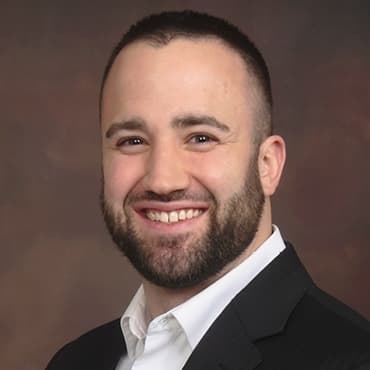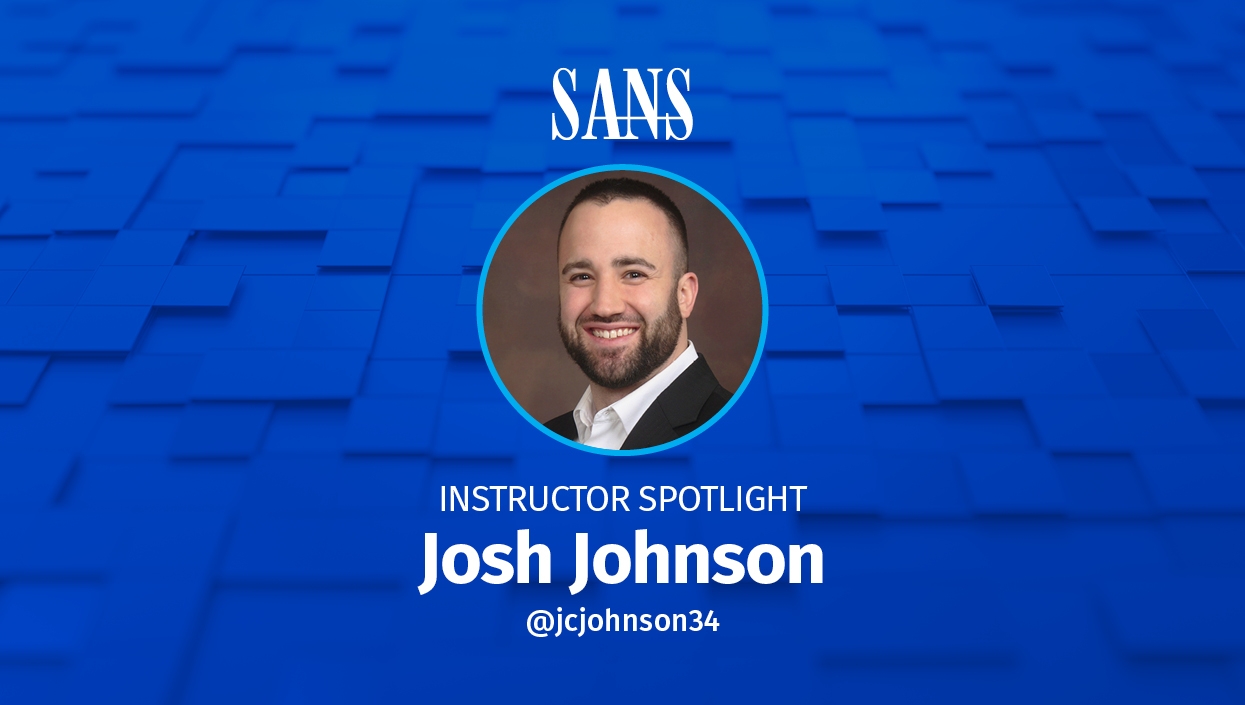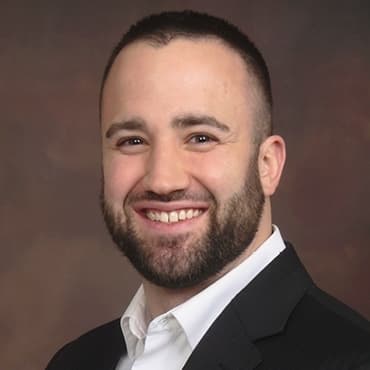SEC595: Applied Data Science and AI/Machine Learning for Cybersecurity Professionals


Experience SANS training through course previews.
Learn MoreLet us help.
Contact usBecome a member for instant access to our free resources.
Sign UpWe're here to help.
Contact UsGet to know Josh Johnson, instructor for SEC530.


Josh Johnson is a SANS Certified Instructor. He has been working in the Information Security industry for over 10 years in varying roles with responsibilities ranging from penetration testing to incident response. Josh was Purple Teaming since before it had a name and used his offensive security skill set to find and pursue his true passion - Blue Team. Since then, he has been helping organizations of all sizes, and in varying industries from healthcare to retail to finance, improve their cyber defense capabilities.
Funny story – I was a first-year Computer Science major, and the professor had a rule that he needed to be able to ‘sit on the keyboard’ and our code should still work. I stayed late and asked for some details on why that actually matters. Next thing I know, I’m looking at software exploits. It made no sense at first, but it forced me to learn the fundamentals and expand my skills from there. Writing my first (extremely basic) buffer overflow for a vulnerable piece of software was a massive thrill. I knew I wanted to work in security from that point forward.
My first GIAC cert was the GCIH, and I challenged the exam. I spent many hours after the first practice exam learning everything I could about the topics covered. It was immersive and overwhelming at the same time. My first course was SEC542 with Kevin Johnson. The material paired with Kevin’s teaching style was engaging and caused me to sign up for the SANS MSISE program later that year.
I teach SEC530: Defensible Security Architecture and Engineering: Implementing Zero Trust for the Hybrid Enterprise. I am a huge fan of this course, as it presents architecture-based solutions to common problems facing organizations, and quick wins that are easy for Blue Teamers but make life difficult for attackers.
I practice it because I love it. It’s like I found a hobby that I can also turn into a career. I’m so lucky in this regard, that I’m excited to do this work. Also, I get bored easily and Information Security is one of those fields that just doesn’t let you get bored. I research and teach because it’s the ultimate satisfaction not just to do this work, but to enable others to be more capable or efficient at doing this work as well. There is no shortage of opportunity in our field, and helping others succeed brings me more joy than any personal victory. Whether it is a script I share to automate a task, or an in-depth discussion on a topic in class, I just want to help others. I’ve been so fortunate to have fantastic mentors in this field, and I want to pay it forward to the community wherever I can.
Find something you love and go as deep as you can on it. Research until Google results no longer give you what you’re looking for and then buckle down; go deeper. This in-depth approach ensures that you are an expert in that area. It’s also okay to bounce around for a bit to feel out the space. Maybe you think exploit development, intrusion analysis, etc. is the field where you want to specialize, only to find out that the passion isn’t there. It’s a great thing to learn this and shift directions as it helps develop a well-rounded skill set and makes you stronger in the end.
The second piece of advice might sound like a contradiction at first, but make sure you don’t lose sight of the big picture. Most cybersecurity professionals are in roles where they need to enable the business. Understanding the business’s priorities and goals can help us get out ahead of upcoming challenges, prepare for technology evolution, and most importantly, fulfill the mission of that business, safely.
I learned this the hard way early in my career. I had found a Cross-Site Scripting flaw in a company's website and prepared a demo to show the exploitation of this bug to senior leadership in an effort to demonstrate the need to invest in web application security. So I’m sitting at the table with these executives, and I show a reverse shell calling out to a host I own for command-and-control. I start keylogging and leveraging the webcam to take a snapshot of that executive sitting at the ‘compromised’ laptop. All the while, I’m showing my command-line perspective of the attack. I finish the demo and look up… What did I see? It wasn’t at all what I expected. Everyone was looking at their email or browsing the web. I had completely missed the big picture. They didn’t care about the nuances of the exploitation. They only cared about the business impact. This experience had a profound impact on the way I have approached helping organizations ‘sell’ security controls from that point forward. Not losing sight of what the business you support actually cares about pays massive dividends in helping influence positive change.
I mentioned that after my first course, I signed up for the SANS MSISE program. From instructors to advisors, that program has drastically changed the trajectory of my career. Through the certs and coursework to publications and presentations, so many doors were opened and relationships made. I have too many people I see as mentors in this field and who have helped shape and influence my career. Just to name a few - Justin Henderson, Eric Conrad, Seth Misenar, John Hubbard, and Mick Douglas.
I find it strange that I ended up a SANS Instructor. I hated public speaking at first and only got hooked after being coerced into giving a conference talk. I was terrified of getting up in front of other pros who I was sure had deeper knowledge and better skills than me. In the end, someone came up and told me that my talk just helped them work through a mental block they had regarding the topic. They asked if I could help them further and a great professional relationship and friendship came out of the experience.
Nothing brings me more joy than hearing a former student reach out and say ‘that PowerShell one-liner’ or ‘architecture tip’ just saved my bacon. It’s a ton of work to teach for SANS and to stay current in order to deliver the expected value to students in my classes. Every run of a course, even if I’ve run it countless times, takes hours of preparation. I honestly probably wouldn’t be doing this if not for these massive motivation boosts I get after hearing I’ve helped someone.
“Fools talk, Wise Men Listen, Cowards Stay Silent” – we have so much to learn from those around us if we would just listen. Try not to talk over that junior analyst because, believe it or not, there is just as much wisdom that they can impart on us as we can provide with our own thoughts.
Teddy Roosevelt’s Man in the Arena – This is my go-to whenever I hit a wall and need some inspiration to dig deeper.
Songs – too many to call out here. There is no genre I dislike. However, when coding, I find instrumental genres like Post-rock to be best. I can jam out while not being distracted by lyrics and focusing on the task at hand.
Books – anything by Malcom Gladwell.
I love woodworking in my free time. Obviously, we have tremendous impact on our organizations day-to-day, but there is something uniquely satisfying about building something with my own hands and having a physical, tangible result. Outside of that, I cherish time spent with family including my wonderful wife and two fun-loving boys.
Read Josh's full bio here.


Josh has been working in Information Security for 10+ years. He enjoys contributing to the community by sharing research and tools that help bolster blue team capabilities; tools that have been used in preventing and detecting large-scale incidents.
Read more about Josh Johnson